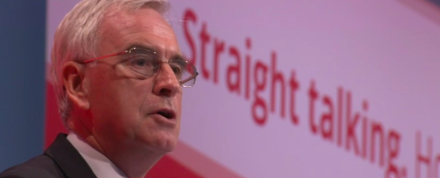
John McDonnell proposed People’s Quantitative Easing shortly after Jeremy Corbyn was made leader of the Labour Party. It might have been wiser at the time to promise nothing controversial because the party establishment were in a state of shock at Corbyn’s win and were hostile to radical economic policies.
McDonnell has since gone quiet on the idea. However, the concept appears to be gaining traction as Adair Turner and Martin Wolf have each recently advocated “helicopter drops” for monetary policy, as an aide to the sluggish world economy. The helicopter drop is an idea of Milton Friedman whereby the central bank would print off cash and give it directly to the general population.
McDonnell’s idea is to use money created through Quantitative Easing to invest in infrastructure rather than buying government bonds. The latter has had the effect of boosting the stock market without boosting capital investment by the listed companies. In fact, the low interest environment has often resulted in companies borrowing money to buy back their own shares rather than investing in expansion. In America, Apple has issued bonds to pay dividends to share holders, in order to avoid bringing home their foreign earnings. As long as it stays abroad they don’t have to pay tax. This wasn’t the intention of the policy.
Some of the initial Labour hostility to McDonnell’s proposal was later retracted. Some backbenchers have referred to Quantity Theory – that too much money in circulation will cause inflation. When inflationary pressures emerge, the Bank of England must raise interest rates to incentivise saving. In this way the quantity of money in circulation is reduced, heading off the inflation.
If the Bank of England were to print £10bn which is then immediately spent on infrastructure investment, then the amount of money in the economy has increased by £10bn. The Governor’s job is to ensure inflation stays below 2 per cent. In order to avoid missing this target he would need to increase interest rates to reduce the amount of money entering circulation elsewhere.
Some would argue that increasing the interest rate can have the effect of reducing economic activity. However, the interest rate is the police officer of the policy, as no Chancellor wants to raise interest rates so high that the economy slows down. This would ensure that the policy is always approached with caution and moderation.
So fears that the Bank of England would lose control of the money supply are misplaced. In fact, People’s Quantitative Easing is a subtle form of taxation. Those who take on debt will pay a tiny bit more in interest rates, and the government gets billions to invest in infrastructure.
So far no central bankers have advocated People’s Quantitative Easing or helicopter cash. The Bank of Japan is being innovative with the use of negative interest rates, while the European Central Bank is continuing with conventional QE, having had a major battle persuading the Germans of the merits. America, meanwhile, seems distracted by the bizarre antics of the Republican Party who prefer to talk about walls in Texas and Arizona.
There is also the question of whether it will be needed, as the British economy is in positive growth after all. However, the British economy is slowing down and the world economy is already sluggish. The massive UK trade deficit suggests that much of our recent growth has been based on foreign supplied debt.
In the foggy economic future we face, People’s Quantitative Easing might well be an important economic tool. It would be wise of John McDonnell to keep the conversation running on this one.




More from LabourList
‘The soft left sets out its stall’
Labour MPs raise concerns for international norms as Foreign Secretary responds to US action in Venezuela
‘Labour’s apprenticeships and skills focus will restore pride, opportunity and growth to communities’